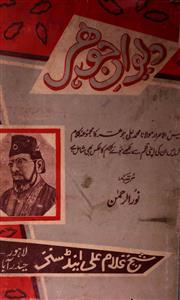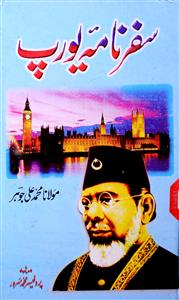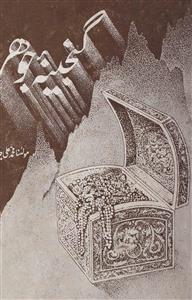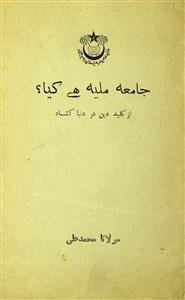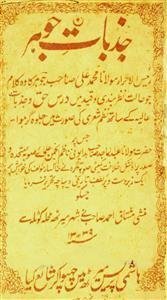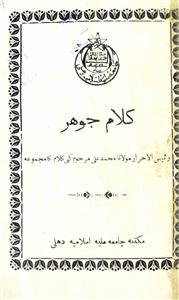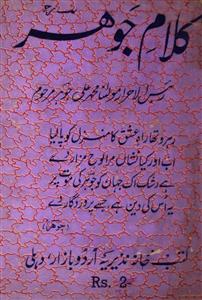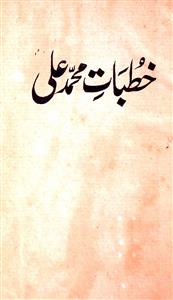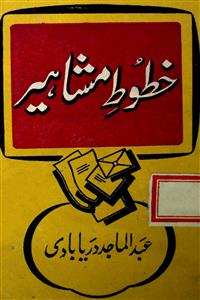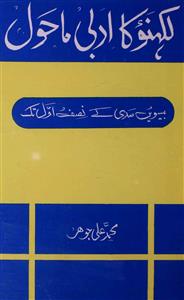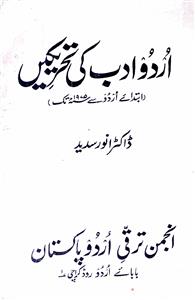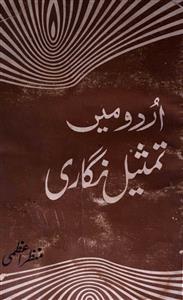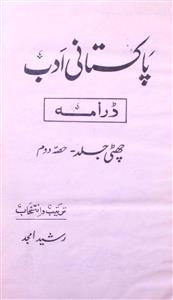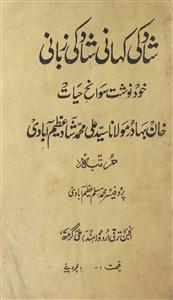 For any query/comment related to this ebook, please contact us at haidar.ali@rekhta.org
For any query/comment related to this ebook, please contact us at haidar.ali@rekhta.org
About The Book
یہ کتاب رئیس الاحرار مولانا محمد علی جوہر کی شاعری کا احاطہ کرتی ہے ۔مولانا کو دست قدرت نے قیادت، صحافت، خطابت کے ساتھ ساتھ شاعری کی زبردست قوت عطا کی تھی۔زیر نظر کتاب کی ابتدا میں ایک طویل مضمون ہے ۔اس میں مولانا کا شعرو شاعری میں اتم شوق کے بارے میں بیان ہے۔ اس کے علاوہ ان کی زندگی کے مختلف جہات پر روشنی ڈالی گئی ہے۔ شعری کلام کا آغاز قطعات سے ہوا ہے۔ اس کی شروعات جس قطعہ سے ہوئی ہے اسے ۱۹۰۷ میں سر سید کی برسی کے موقع پر پڑھا گیا تھا ۔ آگے متعدد قطعات مذہبی نوعیت کے ہیں۔ جیل میں بیٹی کی بیماری کی اطلاع ملی، افسردہ ہوکر ایک قطعہ کہا، اسے یہاں نقل کیا گیا ہے۔ دوسرے حصے میں غزلیات نمونہ کلام کے عنوان سے کچھ غزلیں پیش کی گئی ہیں۔ خاص بات یہ ہے کہ غزل کا سنہ اور مہینہ بھی لکھ دیا گیا ہے۔ اس کے آگے " غزلیات ردیف وار" ہے۔ کس حرف کی ردیف میں کتنی غزلیں ہیں؟ نمبر دے کر واضح کردیا گیا ہے۔کتاب کے اختتام میں مولانا مرحوم کی آخری غزل بھی شامل کی گئی ہے جو انتہائی پرسوز ہے۔
About The Author
Mohammad Ali Jauhar was born in 1878 in Rampur. His father Abdul Ali Khan was associated with the Rampur court. His father passed away when he turned two and acquired his initial studies under the guidance of his mother. He was schooled in Rampur and Bareily and then graduated with distinction from Aligarh. Pleased with his good performance, his brother, Maulana Shaukat Ali sent him to Oxford for I.C.S. where he chose History and Law as his subjects. On his return in 1899, he worked for states of Rampur and Baroda. After sometime he moved to Kolkata and started a weekly ‘Comrade’. Alongwith English, his mastery over Urdu was also perfect. He started an Urdu daily 'Hamdard’ for public. He expressed his opinions against the British fearlessly and spent a major part of his life in imprisonment for participating in Freedom movement with no impact, however, on his patriotic fervor. In 1919, he started Khilafat Movement in which Indian muslims supported him wholeheartedly, then he participated in Gandhiji’s Non-co-operation Movement. Under the influence of this movement, he founded Jamia along with Gandhiji, which has now become Central University. He was an active member of Congress and was imprisoned for many years for non-co-operation.Upon his release in 1923, he was appointed the President of Congress Party and worked for Hindu-Muslim unity. Anguished by nation’s agony, Maulana visited England for the Round Table Conference and in spite of being unwell; he delivered a fiery speech which is worth writing in golden letters in the history of Indian freedom movement. Apart from being a master author, Maulana had a mastery over poetry and prose. He was interested in poetry since his childhood and the poetic ambience of Rampur proved to be a boon for him. Those days, Dagh’s fame was at its zenith, apart from Ameer, Tasleem and Jalal. Daagh was so impressed with his intelligence that if he did not visit, he was called to come. Towards the end, he became interested in ‘ishq-e-haqeeqi’ but could not devote much time due to engagements. His two brief collections have been published entitled “ Kalam-e-Jauhar’
 For any query/comment related to this ebook, please contact us at haidar.ali@rekhta.org
For any query/comment related to this ebook, please contact us at haidar.ali@rekhta.org

